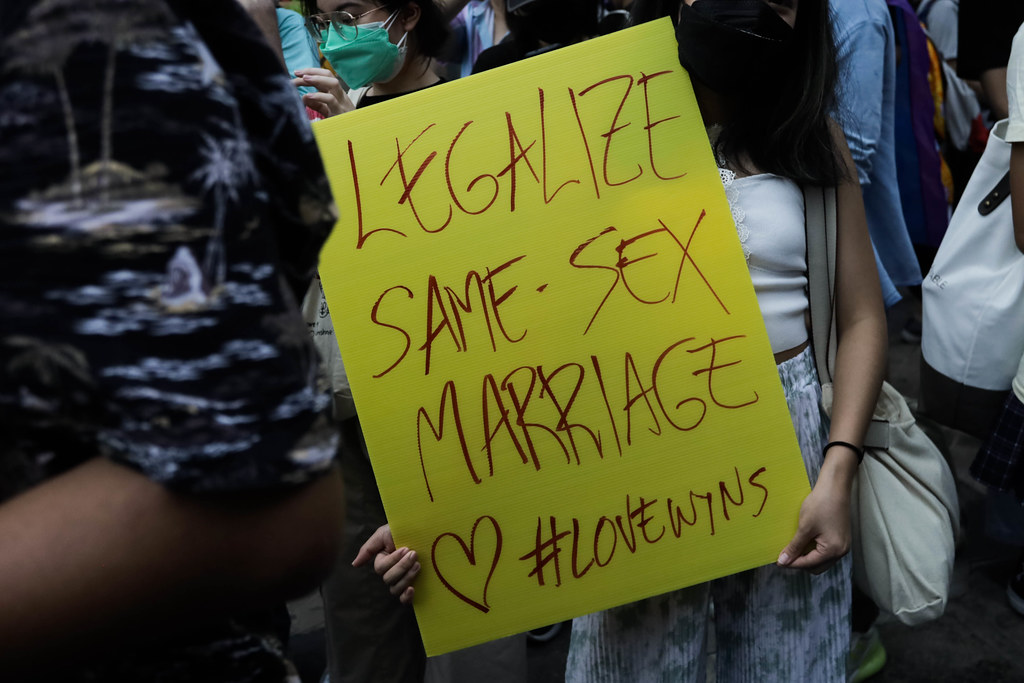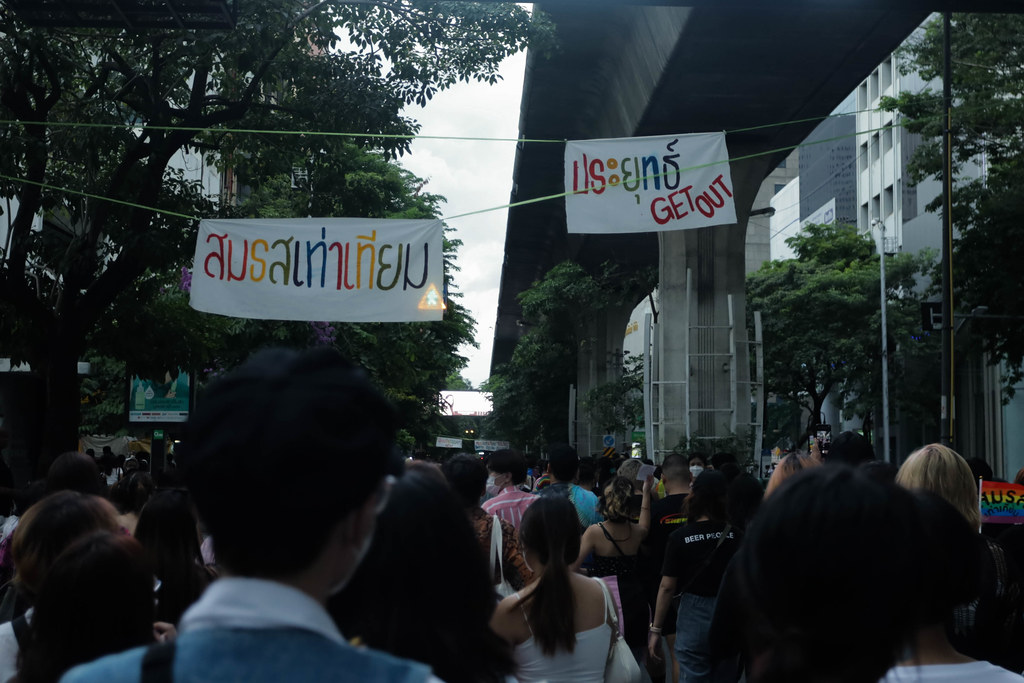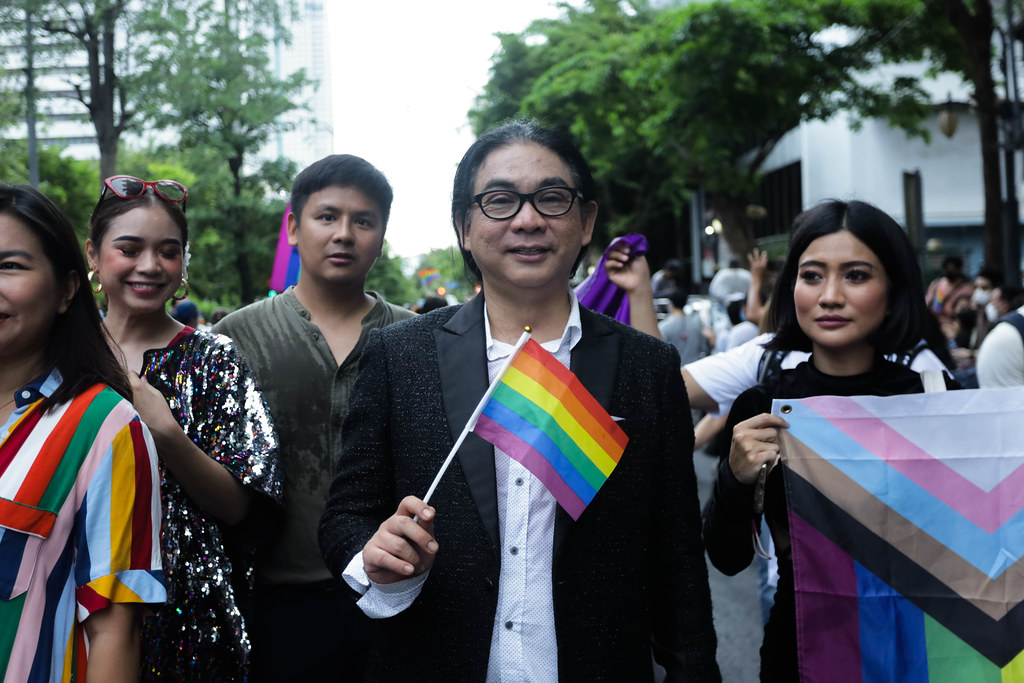The first reading of the Marriage Equality bill has once again been delayed, while the Cabinet has endorsed the Civil Partnership bill, previously criticised for not granting the same rights and dignity to LGBTQ couples as heterosexual couples.

A sign seen at the Pride parade in Bangkok on Sunday (5 June)
The bill proposing amendments to the sections on marriage and family in the Civil and Commercial Code, commonly known as the Marriage Equality bill, proposed by the Move Forward party (MFP), was scheduled to go before parliament yesterday (8 June), after it was forwarded to the Cabinet for a 60-day consideration period.
However, its first reading has once again been postponed for another week after parliament spent 6 hours debating a bill legalising cannabis and another 3 hours debating the Progressive Liquor bill, which aims to amend the Excise Tax Act to allow for small- and medium-sized breweries to enter the alcohol market. It is expected that the Marriage Equality bill will go before parliament when it reconvenes next Wednesday (15 June).
The bill has been on parliament agenda since November 2020. After parliament voted in February 2022 to forward it to the Cabinet for consideration, the Cabinet rejected it, claiming that it is similar to the Civil Partnership bill proposed by the Ministry of Justice.
It proposes that the terminology used in the current marriage law be changed to use “spouse” instead of “husband” and “wife” and “person” instead of “man” and “woman.” If passed, the proposed amendments would allow individuals to be legally married regardless of gender, and ensure that they receive equal rights, duties, and protection under the law. If the bill passes, LGBT couples who have registered their marriage will be able to adopt children together, make medical decisions on behalf of their partner, and in cases where one partner dies, the other will be able to inherit from their partner and make legal decisions about their partner’s assets.
iLaw reported that, while the bill has been under consideration by the Cabinet, the Secretariat of the Cabinet asked the Office of the Council of State to consult government agencies on the bill, 8 of which said they agree with amending the Civil and Commercial Code. Agencies within the Ministry of Social Development and Human Security (MSDHS), including the ministry’s Office of the Permanent Secretary and the Department of Women’s Affairs and Family Development, supported the bill. The MSDHS permanent secretary said that the 2015 Assisted Reproductive Technologies Act might need to be amended to change the terms from “husband” and “wife” to “spouses,” while the Department of Women’s Affairs and Family Development said that the Civil and Commercial Code should be amended to prevent gender-based discrimination.
Meanwhile, agencies under the Ministry of Foreign Affairs said that the Civil and Commercial Code should be amended to comply with international agreements, such as the International Covenant on Civil and Political Rights (ICCPR).
The Bureau of the Budget, Office of the National Economic and Social Development Council, the Ministry of Interior’s Department of Provincial Administration, and the Office of the Judiciary also support the bill.
The Office of the Council of State, however, told the Cabinet that they should reject the Marriage Equality bill, using the Constitutional Court’s ruling that the current marriage law does not violate the Constitution and which states that people who are different should be treated differently as grounds for their reasoning. It also said that it is more appropriate to draft a specific law allowing LGBTQ people to establish a family than to amend the Civil and Commercial Code, which was written according to tradition and human nature.
Cabinet endorsed Civil Partnership bill.

Banners saying "Marriage equality" and "Prayut get out" seen hanging above the route of the Pride parade on Sunday (5 June)
A day before the Marriage Equality bill was scheduled to go before parliament, the Cabinet endorsed the Civil Partnership bill, proposed by the Ministry of Justice and approved by the Office of the Council of State.
Government spokesperson Ratchada Thanadirek said on Tuesday (7 June) that the bill aims to support the formation of families for same-sex couples and give them the same rights as married couples, and that the Ministry of Justice has consulted with relevant groups and found that religious representatives did not oppose to the law because they understand that Thailand is a “multicultural society.”
The bill defines a civil partnership as a union between two people of the same gender, both of whom must be at least 17 years old and at least one of whom must be a Thai national. The bill states that civil partners must live together as family, and that the partnership ends when one partner dies. It also lists the circumstances in which partners may seek divorce, such as domestic violence or infidelity.
The bill allows civil partners to adopt children together and inherit property from each other. Partners may also make medical decisions on each other’s behalf and to organize their partners’ funerals. It also states that sections relating to marriage and family in the Civil and Commercial Code may apply mutatis mutandis to civil partners in some cases.
Deputy Prime Minister Wissanu Krea-ngam said that there needs to be different legislation because same-sex marriage is not the same as heterosexual marriage. He also said that, if the bill could not be considered by parliament during the current session, it can still be placed on the agenda for the next session, and that if the bill is not passed while the current government is in office, it will be up to the next government to pass the bill or withdraw it and propose a new law.

MFP MP Tunyawat Kamolwongwat (centre) during the Pride parade in Bangkok on Sunday (5 June)
MFP MP Tunyawat Kamolwongwat, who proposed the Marriage Equality bill, said yesterday (8 June) after it was reported that the Civil Partnership bill is likely to go before parliament at the same time as the Marriage Equality bill, that the two bills are not the same, and asked why the government does not legalise marriage regardless of gender if the intention is to make a civil partnership equal to marriage. Tunyawat also asked that parliament listen to what the people want, especially during Pride month, during which the LGBTQ community celebrates their identities and demands their rights.
The Civil Partnership bill has also been previously criticized by the civil society for being unclear about whether certain rights are granted. Concerns have also been raised that having a separate legislation for LGBTQ marriage would worsen the stigma against the LGBTQ community in Thailand.
The activist and civil society network Rainbow Coalition for Marriage Equality said that no other law mentions civil partnerships, so every other law needs to be amended to grant civil partners equal rights, and that having a separate law would put LGBTQ couples at risk of rights violations and discrimination, especially if the process of registering a civil partnership differs from that of registering a marriage. It would also raise the question of whether a civil partnership is less than a marriage.
The network also said that the provision in the Civil Partnership bill that laws regarding the family apply mutatis mutandis to civil partners means that it would be up to a state official’s interpretation whether a person would be granted certain rights and that a court would need to be involved if there is a dispute. It could also make it difficult to campaign for further amendments to the Civil and Commercial Code as it could be argued that LGBTQ marriage is already legalized.

A participant in Sunday's Pride parade holding a sign inviting people to back the proposed amendments to the Civil and Commercial Code
The network said that it will continue to collect signatures so that it can propose its own Marriage Equality bill, which was launched on 28 November 2021, during a protest at the Ratchaprasong intersection and proposed to amend the Civil and Commercial Code to allow marriage registration between two people of any gender.
The amendments will grant LGBTQ couples the same rights, duties, and legal recognition as heterosexual couples, including the right to adopt a child together and be recognized as the child’s parents, the right to have the power of attorney to make medical decisions of behalf of one’s partner and to press charges on behalf of one’s partner, the right to use one’s partner’s last name, and the right to inherit property from each other without the need for a will.
Within 24 hours of its launch, the petition gained over 150,000 signatures, ten times the number legally required for a bill to be put before parliament, and as of 18.00 on 9 June, it has over 351,000 signatures.
Prachatai English is an independent, non-profit news outlet committed to covering underreported issues in Thailand, especially about democratization and human rights, despite pressure from the authorities. Your support will ensure that we stay a professional media source and be able to meet the challenges and deliver in-depth reporting.
• Simple steps to support Prachatai English
1. Bank transfer to account “โครงการหนังสือพิมพ์อินเทอร์เน็ต ประชาไท” or “Prachatai Online Newspaper” 091-0-21689-4, Krungthai Bank
2. Or, Transfer money via Paypal, to e-mail address: [email protected], please leave a comment on the transaction as “For Prachatai English”
